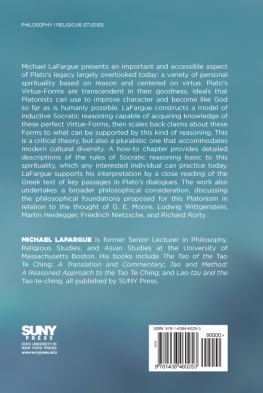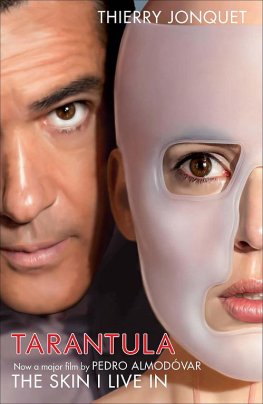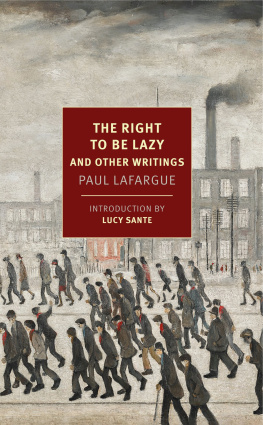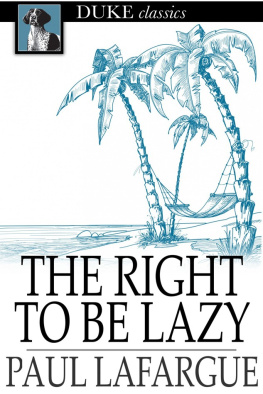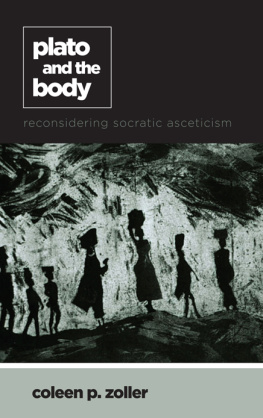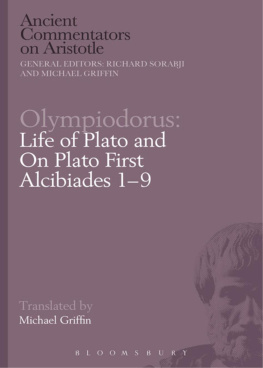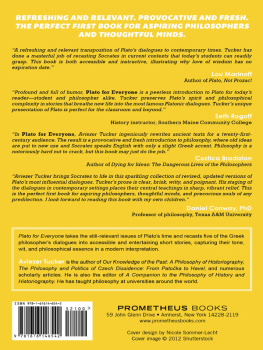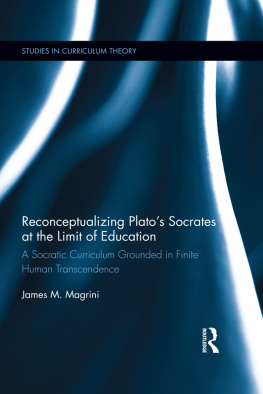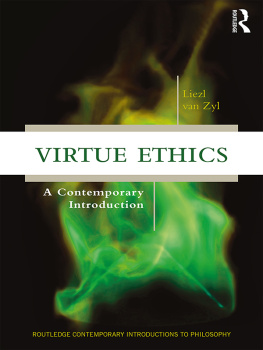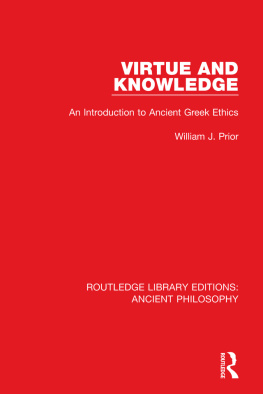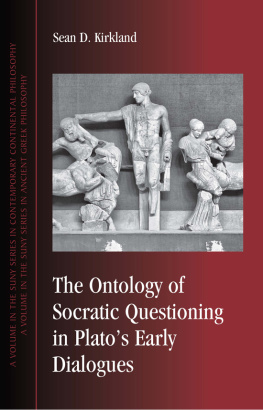Rational Spirituality and
Divine Virtue in Plato
Rational Spirituality and
Divine Virtue in Plato
A Modern Interpretation and
Philosophical Defense of Platonism
Michael LaFargue
Published by State University of New York Press, Albany
2016 State University of New York
All rights reserved
Printed in the United States of America
No part of this book may be used or reproduced in any manner whatsoever without written permission. No part of this book may be stored in a retrieval system or transmitted in any form or by any means including electronic, electrostatic, magnetic tape, mechanical, photocopying, recording, or otherwise without the prior permission in writing of the publisher.
For information, contact State University of New York Press, Albany, NY
www.sunypress.edu
Production, Eileen Nizer
Marketing, Kate R. Seburyamo
Library of Congress Cataloging-in-Publication Data
Names: LaFargue, Michael.
Title: Rational spirituality and divine virtue in Plato : a modern interpretation and philosophical defense of Platonism / Michael LaFargue.
Description: Albany : State University of New York Press, 2016. | Includes bibliographical references and index.
Identifiers: LCCN 2015017382 | ISBN 9781438460253 (hardcover : alk. paper) | ISBN 9781438460260 (e-book)
Subjects: LCSH: Plato. | Platonists. | Virtue.
Classification: LCC B395 .L3155 2016 | DDC 184dc23
LC record available at http://lccn.loc.gov/2015017382
10 9 8 7 6 5 4 3 2 1
This book is dedicated
to my wife and dearest companion,
Hilda
Contents
Preface
S hortly after I began university teaching in 1978, I was assigned to teach a course initially called Socrates, Jesus, and Buddha (which later morphed into Buddha, Jesus, Plato). This course title was taken from a book by Karl Jaspers, and its breadth is a credit to the breadth of vision of Richard Horsley, the then Chair of the Study of Religion program at the University of Massachusetts, Boston. One of my main aims early on was to teach students to think well, so I began immediately trying to derive from Platos writings a method of Socratic reasoning that I could teach students to actually practice (rather than only write about ). This also suited the place of this course as a Sophomore seminar in the General Education program at UMass Boston.
I taught this course nearly every semester for about thirty-five years. This is the context in which I developed the main ideas presented in this book. My own interest in fundamental philosophical issues led me to develop many facets of the present book beyond what I tried to teach in the classroom. I had earlier learned the art of close reading and contextual interpretation of ancient Greek texts in many seminars with Dieter Georgi. And of course I am grateful for general support by many faculty colleagues and friends at UMass Boston. But most of all I have to give credit to the hundreds of students over all those years who struggled with me to try to understand the thinking of Socrates and Plato, and what we might learn from them that is still valuable today.
Introduction
T he late classics scholar Pierre Hadot argued that in the ancient world, living a certain way of life was central to what it meant to be a philosopher. Hadot introduces one collection of his essays (2004, 23) by contrasting the impression that most students have of philosophy today because of the exigencies of university teaching, with ancient concepts of what it mean to be a philosopher. In this ancient concept, being a philosopher
demands from the individual a total change of lifestyle and conversion of ones entire being This existential option implies a certain vision of the world, and the task of philosophical discourse will therefore be to reveal and rationally justify this existential option, as well as this representation of the world.
The present book argues that these remarks are eminently true of Platos conception of his ideal philosopher, as is most evident in his picture of the true philosopher in the Republic , Books 57. Here the most crucial characteristic of a Platonist philosopher is not specialized expertise in inquiry and argument. Rather, philosophical reasoning is to be pressed into the service of formulating divine virtue-ideals, transcending ordinary social standards in the perfection of their goodness. And this project of rational thought about virtue is not complete until the philosopher manages to mold his own character on the model of these perfect virtue-ideals he has thus conceived in his mind, becoming as god-like as is possible to man.
This book places this virtue-centered picture of the ideal philosopher at the center of Platos thought, and shows what Platos thought looks like when configured around this center. This results in a configuration and interpretation of major themes in Platos thought fundamentally different from what prevails in the literature today. I also try to show here that, oddly enough, what I will call Platonist otherworldly spirituality is capable of being given a thoroughly rational foundation, something that cannot be said about many philosophical doctrines associated with Platonism today.
Platonist Spirituality versus Platonist Metaphysics
One way of illustrating the results of this approach to Plato interpretation is to contrast it with approaches centered around Platos alleged metaphysics. Basic to the meaning of metaphysics here is the assumption that metaphysics is a theory about the nature of reality. Metaphysical interpretations, beginning already with Aristotle, interpret Platonic Forms as central elements of a theory about the constitution of reality in general (see accounts in Ross 142244; Fine 4465).
Consider horses, for instance. Central to Aristotles account of Platonism is the doctrine that there exists something called Horse Itself (the Platonic Form of Horse), existing alongside and in addition to all individual horses ( Metaphysics III, 2, 997b, 512, see also XIII, 4, 1078b, 3436). This theory not only lacks any plausible rational basis (Aristotle ridicules it); holding it has no direct impact on changing the life of the philosopher.
I focus here instead on Platos theory of Virtue -Forms. Virtue-Forms are not elements in the constitution of reality in general. They are rather ideal models (paradigms Plato calls them) that the philosopher develops in order to have models to model his own character on, in a process of long-term self-transformation. Ethical flawlessness is the main characteristic that Platonic Virtue-Forms need, if they are to serve this function as paradigmatic models. This is because modeling oneself on a flawed model might just make one a more flawed person, rather than a more ethically admirable person. A flawed standard of virtue is not a good measure to measure oneself by, because as Plato says ( Republic 504c), what is imperfect is not a measure of anything ( ateles oudenos metron ).
Flawless Platonic Virtue-Forms are ideals of moral excellence to strive for. As ideals, they do not exist at all in the world of concrete realities. In Platos thought, nothing in the world of concrete realityconcrete individuals, concrete behavior, and concretely conceived rules for behavioris completely flawless. As he pictures it, everything in this concrete world over here consists in a changing mixture of what is good and not good. Plato imagines ( Theaetetus 176ac) another world over there, populated by divine Platonic Virtue-Forms. These are the focus of attention and ultimate concern for the Platonist philosopher, whose central aim in life is to become like God, so far as is possible to man, by becoming as virtuous as possible, this in turn by modeling himself on these ideal models. This gives Platonism its otherworldly character.

